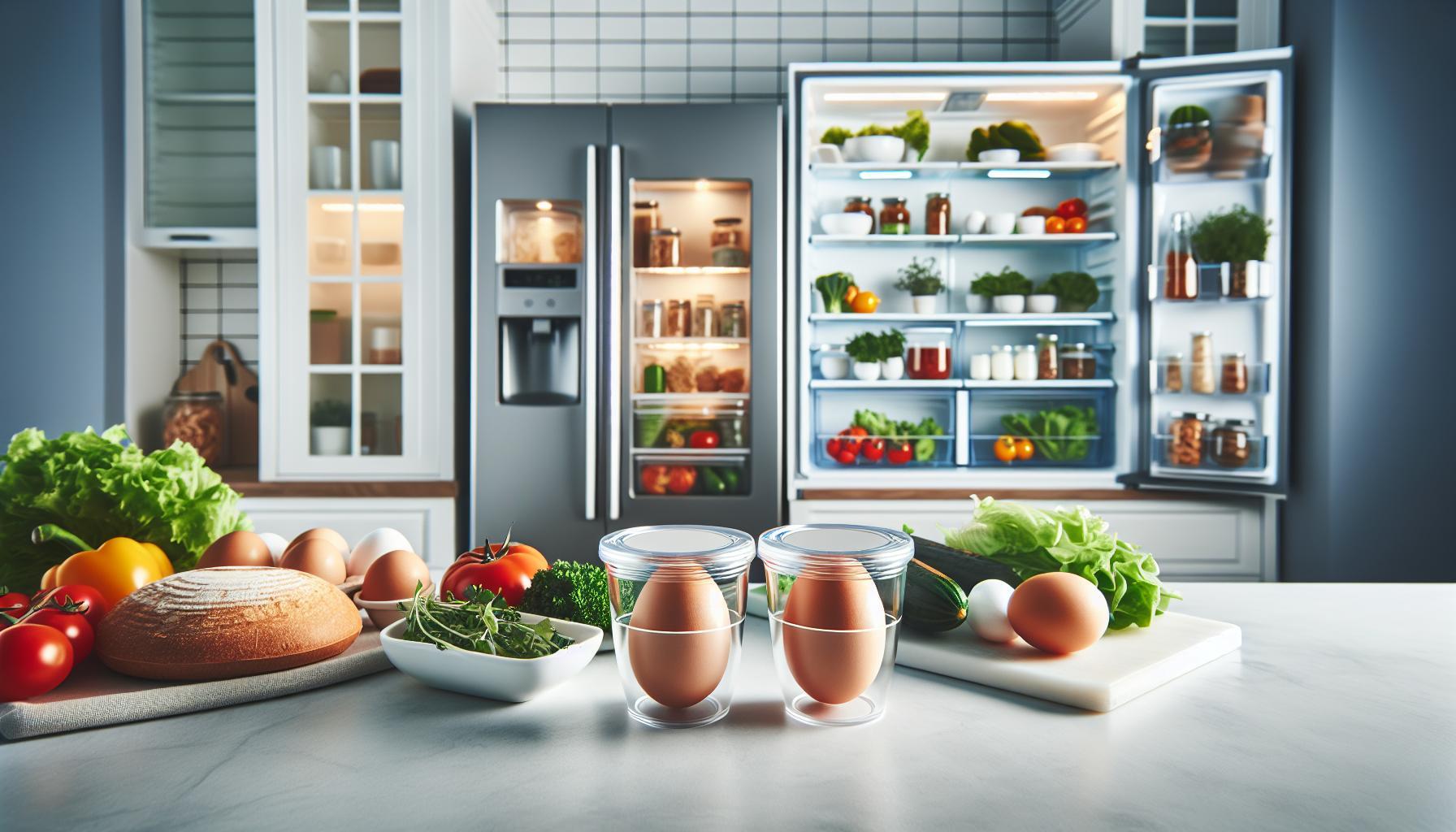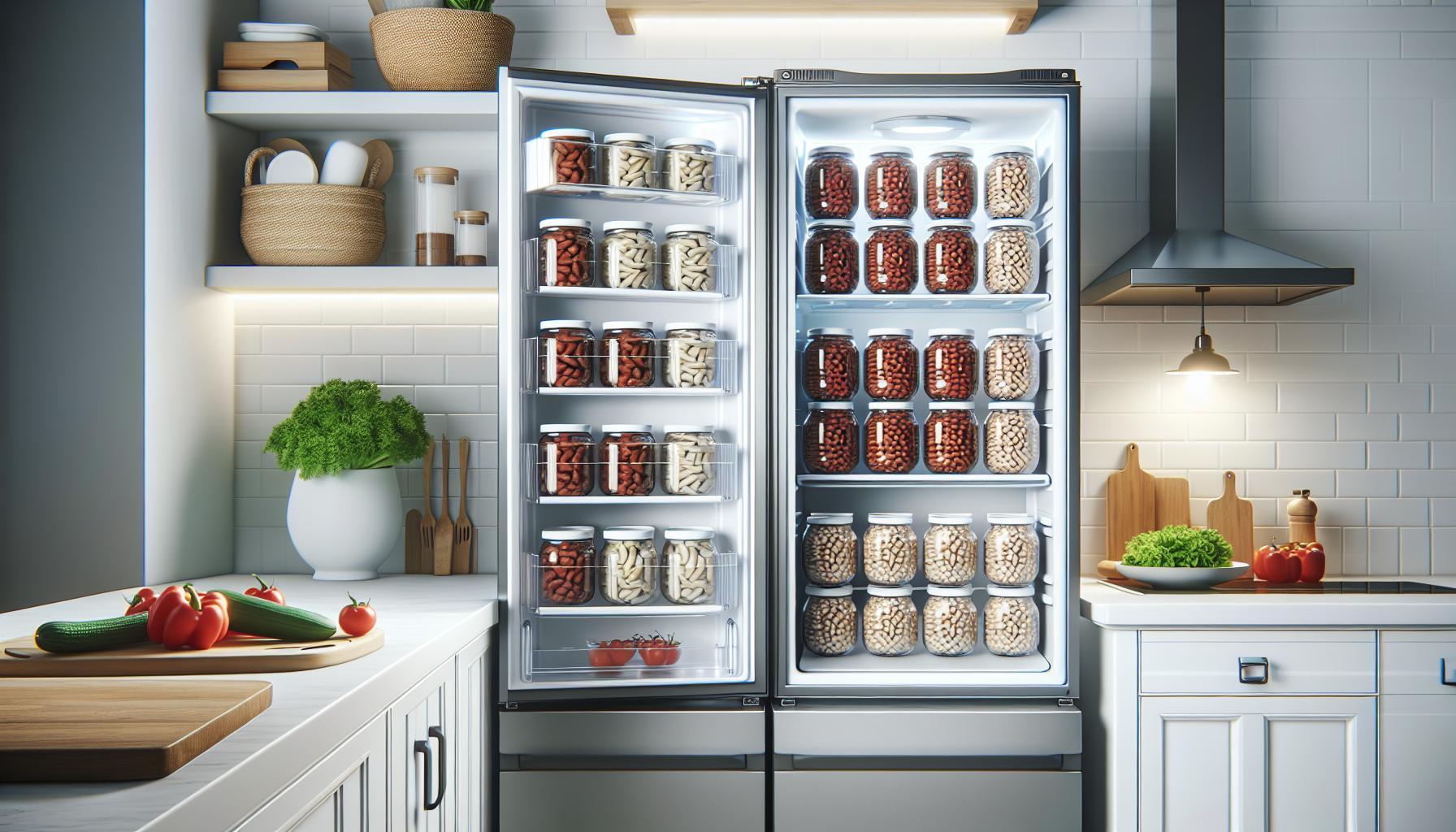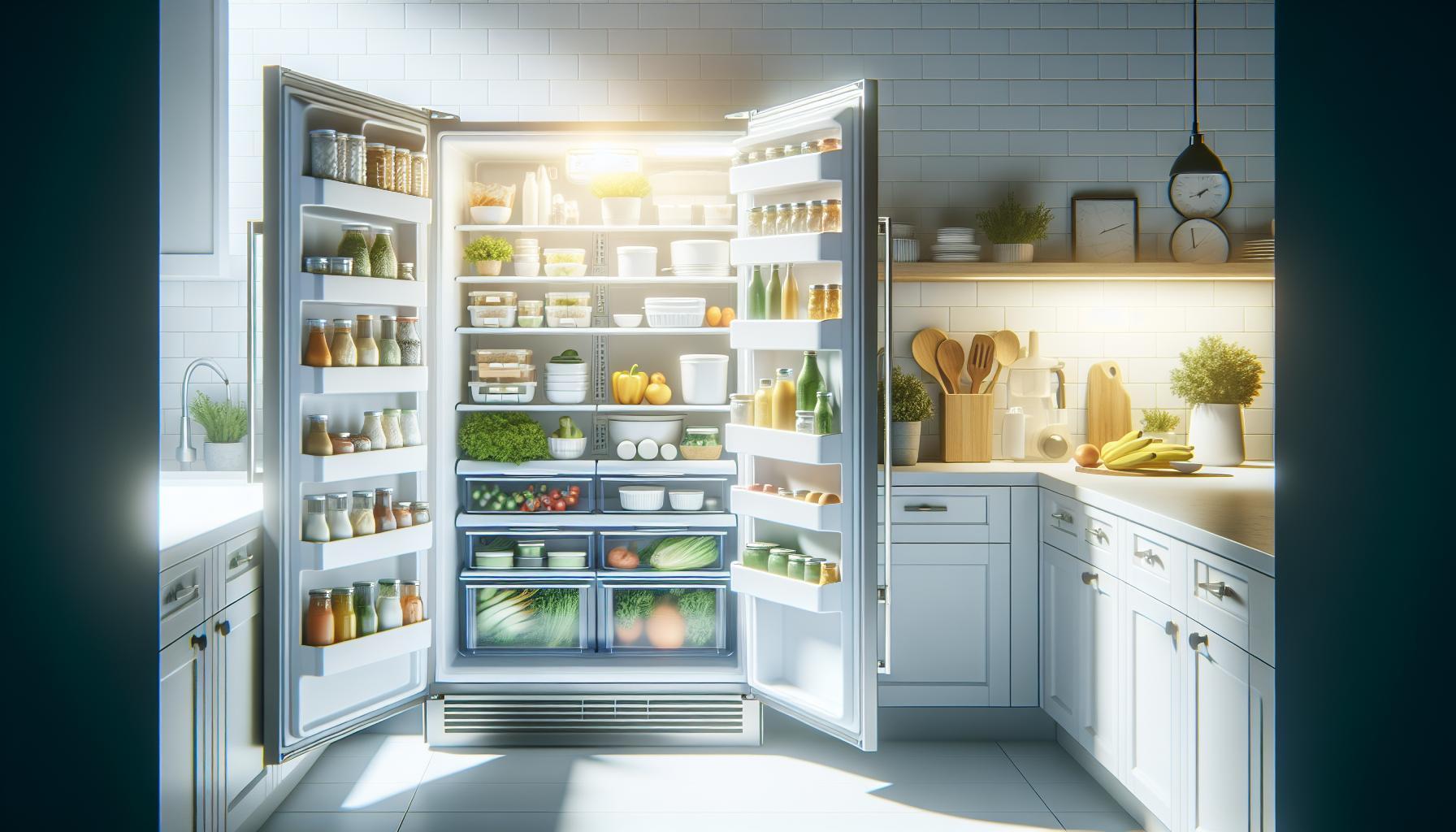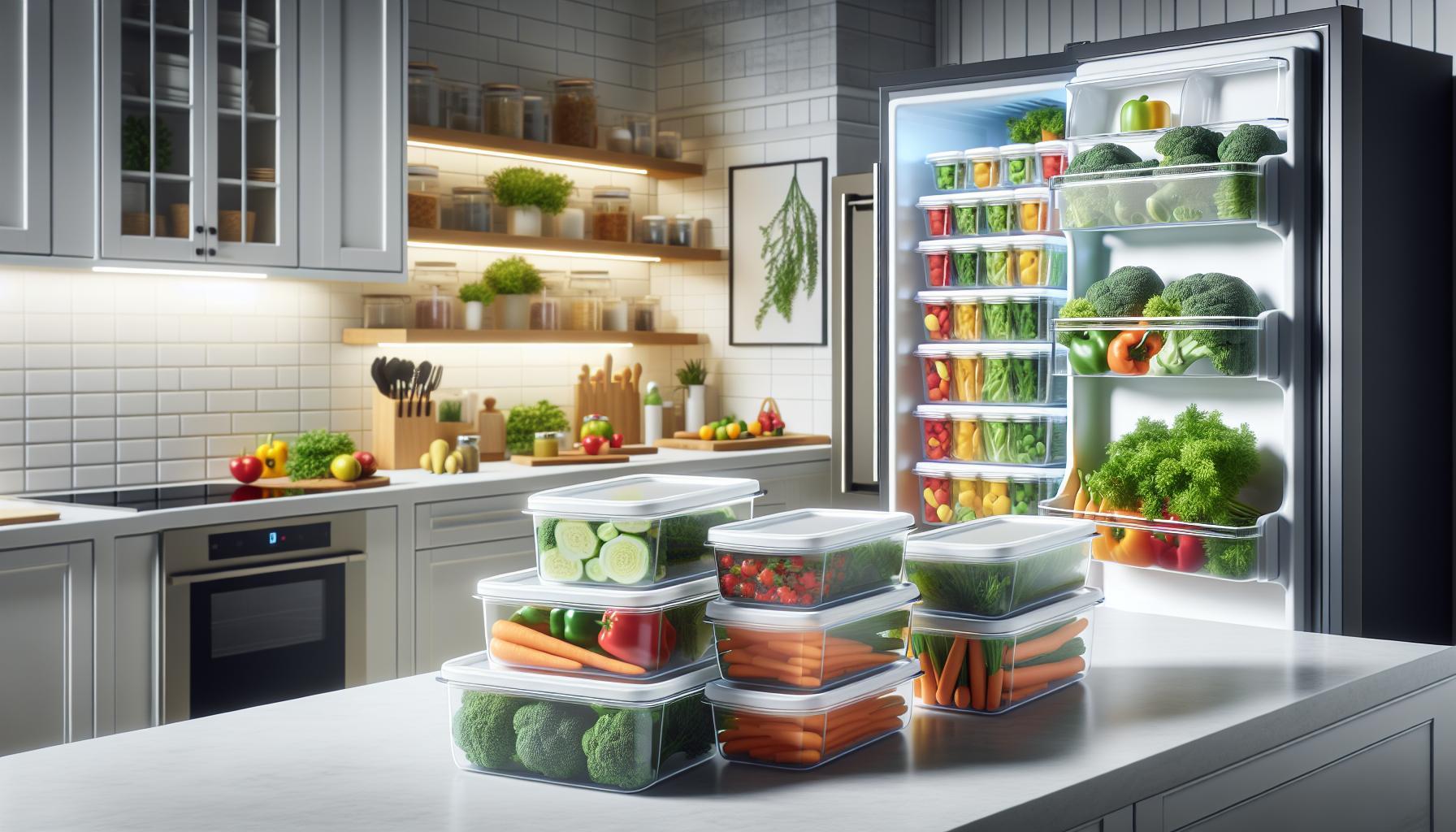Did you know that cooked eggs can safely last in your fridge for about a week? For those of us who love a quick and nutritious breakfast, understanding how long we can keep our cooked eggs on hand is crucial. Often a go-to source of protein, eggs can help kickstart your day-if you know how to store them safely.
Whether you’re meal prepping or just want to enjoy leftovers, ensuring your cooked eggs maintain their freshness is essential for both flavor and food safety. It’s common to worry about when food goes bad, especially with something as versatile as eggs. By mastering proper storage techniques, you can enjoy your meals without uncertainty, making breakfast not just convenient, but worry-free.
Curious about the best practices to keep your cooked eggs safe and delicious? Read on to discover essential guidelines and tips that will help you enjoy this breakfast staple longer and with peace of mind.
How Long Can Cooked Eggs Be Stored?
Cooked eggs, whether boiled, scrambled, or in a casserole, make for a convenient and nutritious addition to meals. However, understanding how long they can be safely stored is crucial for both food safety and quality. Generally, cooked eggs can be stored in the refrigerator for up to 3 to 4 days. After this window, while they may still look fine, the risk of foodborne illness increases, and the eggs may not taste as fresh.
To maximize freshness, store cooked eggs in a covered container to protect them from contaminants and retain moisture. It’s also important to cool the eggs quickly after cooking; ideally, refrigerate them within two hours of preparation. For longer storage, consider freezing cooked egg dishes. When properly frozen, most cooked egg-based recipes can last for up to 2 to 3 months in the freezer without significant loss of quality. However, be mindful that some textures, such as in scrambled eggs, may change upon thawing, which can affect the eating experience.
Additionally, labeling your containers with the date they were stored can help track how long they have been in the fridge or freezer, ensuring you use them while they are still at their best. Always remember: when in doubt, check for any unusual smells or discoloration before consuming leftover cooked eggs, as these could be signs of spoilage. Following these guidelines allows you to enjoy cooked eggs safely while minimizing waste.
Understanding Egg Storage Safety
To ensure that your breakfast remains worry-free and nutritious, understanding the essential practices for egg storage safety is paramount. Cooked eggs, whether boiled, poached, scrambled, or included in casseroles, can be a staple in many diets, but knowing how to properly store them is key to preventing foodborne illnesses. Cooked eggs can safely be stored in the refrigerator for 3 to 4 days, during which time their quality and safety are best maintained.
When storing cooked eggs, it’s important to use airtight containers that prevent exposure to air and moisture, which can quickly degrade their quality. As a rule of thumb, refrigerate cooked eggs within two hours of cooking; this quick cooling minimizes the risk of bacterial growth. If you’re preparing a larger batch, consider portioning them out into single servings, making it easier to grab for meals throughout the week without exposing the entire batch repeatedly to room temperature.
Always be mindful of how to tell if your cooked eggs have spoiled. Before consuming them, check for signs such as off-odors, discoloration, or odd textures. If any of these signs are present, it’s safer to discard them. Regularly labeling your cooked egg containers with dates not only reminds you of their freshness but also helps manage meal prep efficiently. This systematic approach not only safeguards your health but also minimizes food waste, allowing you to enjoy your meals with confidence.
Signs Your Cooked Eggs Have Spoiled
The freshness of cooked eggs can quickly become a concern if you aren’t familiar with the signs of spoilage. While they offer convenience and nutrition, cooked eggs are not immune to bacteria and decay. Understanding how to identify spoiled eggs ensures safety and prevents unnecessary waste. Here are the key indicators to watch for when assessing the edibility of your cooked eggs.
First and foremost, pay attention to any off-odors. Freshly cooked eggs should have a neutral smell, but if you notice a strong, sulfuric, or rotten odor, it’s a clear signal that the eggs have gone bad. Additionally, examine the appearance of the eggs; any signs of discoloration, such as grayish or greenish hues, or an unusual oily or watery film on the surface can also indicate spoilage.
Texture changes are another important factor. If the cooked eggs feel dry, gritty, or excessively slimy, these changes could suggest bacterial growth or degradation of the egg’s quality. It’s also wise to consider how long the eggs have been stored; if they are nearing or exceed the 3 to 4 days storage guideline recommended for cooked eggs, it is best to err on the side of caution and dispose of them. By keeping these signs in mind and regularly checking your stored cooked eggs, you can confidently enjoy them as part of your meals without any worries about food safety.
Optimal Refrigeration Practices for Cooked Eggs
Storing cooked eggs properly is crucial for maintaining their freshness and safety, allowing you to enjoy them without concern. To maximize the shelf life of your cooked eggs, it’s essential to refrigerate them within two hours of cooking. The ideal storage temperature is below 40°F (4°C). Using a refrigerator thermometer can help you ensure that your appliance is functioning correctly. When storing cooked eggs, place them in airtight containers to minimize exposure to air, which can introduce bacteria and accelerate spoilage.
It’s also important to keep cooked eggs in the main body of the refrigerator rather than on the door, where temperatures can fluctuate more frequently. Make sure to label and date the containers, so you’re aware of how long they’ve been stored. For most standard cooked egg dishes, like scrambled eggs or omelets, the recommended storage time is around three to four days. If you notice any changes in smell, texture, or color during this timeframe, it’s better to be safe and discard the eggs.
For longer-term storage, consider freezing cooked eggs. This can be particularly useful for meal prep. However, it’s essential to note that the texture may change once thawed-great for integration into soups or casseroles but perhaps not for a sunny-side-up breakfast. Always ensure you thaw cooked eggs in the refrigerator, and consume them within 24 hours after thawing for the best quality and safety. By adhering to these storage practices, you can enjoy your cooked eggs while minimizing the risk of foodborne illness.
Best Ways to Reheat Leftover Cooked Eggs
Reheating cooked eggs can be an art, as the goal is to retain their delicious texture and rich flavors while ensuring food safety. Many people may find that reheated eggs can sometimes turn rubbery or dry, but with the right techniques, you can enjoy them just as much as the first time.
One of the best methods to reheat leftover cooked eggs is to use the stovetop. For scrambled eggs or omelets, you can add a small amount of butter or oil to a non-stick skillet over low heat. Stir gently while the eggs warm up, which helps distribute the heat evenly, ensuring they stay creamy. This method also allows you to add a splash of milk or a sprinkle of cheese for extra moisture and flavor.
Another effective option is to use the microwave, which is quick and convenient. Place your cooked eggs in a microwave-safe dish and cover it with a damp paper towel to create steam, which helps keep the eggs from drying out. Heat them on medium power in short intervals-about 20 to 30 seconds-stirring in between until they reach your desired temperature. Be cautious with time, as microwaving too long can lead to rubbery eggs.
If you’re rewarming boiled eggs, simply place them in a bowl of warm water for about 10-15 minutes. This method gently heats the eggs without overcooking them further, preserving their tender texture. Avoid reheating boiled eggs in the microwave, as this can cause them to become tough.
No matter which method you choose, always ensure that reheated eggs reach an internal temperature of 165°F (74°C) to ensure they’re safe to eat. By following these tips, you can enjoy leftover cooked eggs without compromising on taste or safety.
Freezing Cooked Eggs: What You Need to Know
Freezing cooked eggs can be a great way to extend their shelf life and reduce food waste. Whether you’ve made a big batch of scrambled eggs, an omelet, or boiled eggs, freezing allows you to preserve their quality and enjoy them later without risk. However, not all types of cooked eggs freeze equally well, and understanding the best practices for freezing can help maintain their texture and flavor.
When preparing cooked eggs for freezing, it’s essential to ensure they are completely cooled before packaging. This helps prevent condensation, which can lead to freezer burn. Divide the eggs into portion-sized amounts to make thawing easier later on. Using airtight freezer bags or containers, remove as much air as possible to minimize freezer burn. You can also consider scrambling eggs, mixing in a bit of milk to maintain moisture, or chopping up hard-boiled eggs for salads and other dishes once frozen.
The key to successful freezing is duration. Cooked eggs maintain their best quality for up to six months when stored correctly in the freezer. While they will still be safe to eat beyond this time, texture and flavor may deteriorate. When you’re ready to use the frozen cooked eggs, it’s best to thaw them in the refrigerator overnight. For quicker thawing, you can place them in a bowl of cold water for a couple of hours. Once thawed, reheat the eggs gently to avoid rubberiness-aim for a maximum internal temperature of 165°F (74°C) as a safety standard.
By taking these steps, you can enjoy the convenience of having prepared meals on hand, reduce waste, and ensure that your eggs are safe and tasty when it’s time to eat. This method not only prevents the hassle of cooking from scratch each time but also allows you to have nutritious breakfast options ready at a moment’s notice.
Using Cooked Eggs in Meal Prep
Having cooked eggs on hand can significantly streamline meal prep and ensure that nutritious options are readily available. Eggs are not only a great source of protein, but they are also incredibly versatile, making them an excellent component of various meals throughout the week. Cooking eggs in bulk and storing them properly allows you to create quick breakfasts, satisfying snacks, or flavorful additions to lunch and dinner.
One common method is to batch-cook hard-boiled or scrambled eggs. Hard-boiled eggs, for instance, can be made ahead and stored in the refrigerator for up to one week. They make an easy grab-and-go snack or can be sliced into salads for added protein. Scrambled eggs are also a fantastic option; they can be portioned out and refrigerated for up to four days. Consider combining them with veggies and cheese for more flavor and nutrition.
Tips for Effective Meal Prep with Cooked Eggs
- Label Your Containers: Always date your storage containers. This practice helps you track how long the cooked eggs have been in the fridge, ensuring they are consumed while still fresh.
- Store Safely: Keep cooked eggs in airtight containers to maintain their moisture and prevent any absorption of odors from other foods in the refrigerator.
- Utilize Space Wisely: If possible, dedicate a specific shelf in your fridge for meal-prepped items, including cooked eggs, to make them easier to grab when you’re in a rush.
Another exciting way to utilize cooked eggs is by incorporating them into various breakfast recipes. For example, you can create a breakfast burrito or wrap by adding scrambled eggs, cheese, and your favorite vegetables, then wrap it securely and store it in the fridge. Alternatively, make egg muffins by whisking eggs with diced veggies and cheese, pouring the mixture into muffin tins, and baking. These are easy to reheat and can be enjoyed throughout the week.
Reheating Guidelines
When it comes to reheating cooked eggs, doing so safely is key. The general recommendation is to reheat eggs until they reach an internal temperature of 165°F (74°C). This not only ensures safety but also helps maintain their texture. You can reheat scrambled or hard-boiled eggs gently on the stovetop or in the microwave. If using the microwave, heat in short bursts of 30 seconds, stirring in between to avoid overcooking.
By incorporating cooked eggs into your meal prep routine, you ensure that you not only have a healthy source of protein at your fingertips but also minimize food waste by using leftovers creatively. Enjoy the convenience and peace of mind that come with a well-planned meal prep strategy!
Health Benefits of Storing Cooked Eggs Correctly
Storing cooked eggs correctly not only enhances their longevity but also maximizes their nutritional benefits. When eggs are cooked and stored properly, they retain essential proteins, vitamins, and minerals, making them a powerhouse of nutrition that can easily fit into any meal plan. Improper storage, on the other hand, can lead to spoilage, which diminishes both taste and health benefits.
To ensure cooked eggs maintain their quality, it’s crucial to refrigerate them promptly after cooking, ideally within two hours. Keeping them in airtight containers minimizes exposure to air and moisture, which can facilitate bacterial growth. Hard-boiled eggs, for example, can retain their taste and texture for up to a week. In contrast, improperly stored eggs may develop off-flavors and an unpleasant texture within a few days. Therefore, adhering to proper storage techniques not only prevents food waste but also helps maintain the eggs’ rich nutritional value.
Additionally, cooking eggs in bulk and storing them correctly allows for greater meal flexibility throughout the week, promoting healthier eating habits. For example, having easy-to-grab hard-boiled eggs on hand can be an excellent way to incorporate high-quality protein into your diet, whether in salads, sandwiches, or as a snack. Properly stored eggs contribute to a balanced diet while minimizing the risk of foodborne illnesses, thus supporting overall health.
Here are a few key tips for storing cooked eggs safely:
- Cool Quickly: Refrigerate within two hours of cooking.
- Airtight Storage: Use airtight containers to prevent moisture and odors.
- Label and Date: Always label your containers with the cooking date for easier tracking.
By following these simple steps, you can effectively enhance the health benefits of your cooked eggs and enjoy their delicious taste for days to come.
Common Myths About Egg Storage Debunked
Misinformation commonly circulates around egg storage, which can lead to food safety issues and unnecessary waste. Understanding the truth behind these myths can empower you to make informed decisions regarding your cooked eggs. For instance, one prevalent myth suggests that you can keep cooked eggs in the fridge indefinitely. While properly stored hard-boiled eggs can last up to one week, they aren’t safe to eat beyond that timeframe due to the risk of spoilage and contamination.
Another myth is that cooking eggs thoroughly eliminates all safety concerns. Although thorough cooking does kill most bacteria, it’s essential to practice proper storage techniques afterward. After cooking, eggs should be refrigerated within two hours to prevent bacterial growth. Keeping them in airtight containers with consistent refrigeration is equally crucial, as exposure to air can lead to odor absorption and diminished quality.
It’s also a misconception that you should peel hard-boiled eggs before storing them. In reality, unpeeled hard-boiled eggs will keep fresher for longer, as the shell provides a natural protective barrier against bacteria and moisture. If you prefer convenience with peeled eggs, keep them submerged in water in the refrigerator to help maintain moisture and freshness.
In summary, dispelling these myths about egg storage not only enhances food safety but also helps you take full advantage of the nutritional benefits cooked eggs provide. By being aware of the proper handling techniques and realistic storage timelines, you can enjoy your eggs worry-free throughout the week.
Creative Ideas for Leftover Cooked Eggs
Leftover cooked eggs can be a culinary treasure when incorporated into a variety of dishes, transforming what might be an overlooked item in your fridge into a gourmet flavor experience. Whether you’re dealing with hard-boiled eggs or scrambled leftovers, there are numerous creative and delicious ways to use them up before they lose their freshness.
One popular option is to slice hard-boiled eggs and add them to salads for a protein boost. Incorporating sliced eggs into a fresh garden or grain salad not only enhances the nutritional value but also adds a creamy texture that complements greens beautifully. You can also prepare classic dishes like egg salad or deviled eggs, both of which allow you to experiment with different ingredients, such as mustard, herbs, or spices, to elevate the flavor.
Incorporating cooked eggs into breakfast dishes is another fantastic way to reduce waste and maximize flavor. Chopped hard-boiled eggs can be added to breakfast burritos or used as a topping for avocado toast, providing a satisfying contrast to creamy textures. Additionally, you can make a quick frittata or omelet by mixing in leftover scrambled eggs with your choice of vegetables and cheese, creating a hearty meal in minutes.
For those interested in meal prep, using cooked eggs in pasta dishes or grain bowls adds not only substance but also a healthy twist. You can mix chopped hard-boiled eggs into pasta salad or sprinkle them on top of a warm grain bowl, benefiting from their versatility while ensuring that no ingredients go to waste. Finally, try using leftover scrambled eggs in a savory pancake or savory muffin recipe for a delightful brunch option that is sure to impress.
By creatively transforming your leftover cooked eggs into new dishes, you not only reduce food waste but also ensure that you have nutritious and flavorful meals ready at your fingertips. These methods highlight the functionality of cooked eggs while putting safety and freshness at the forefront of your cooking practices, keeping your meals delicious and worry-free.
Understanding Egg Shelf Life: Fresh vs. Cooked
Eggs are a staple in many households, but understanding the shelf life of both fresh and cooked varieties can be a game-changer in the kitchen. Fresh eggs, when stored correctly in the refrigerator, can last three to five weeks beyond their pack date. However, once eggs are cooked, their shelf life changes significantly. Cooked eggs should be consumed within three to four days after they have been refrigerated. This shorter timeframe is due to the fact that cooking alters the proteins in the eggs, reducing their natural defenses against bacterial growth.
To maximize the freshness of cooked eggs, it’s essential to follow safe storage practices. After cooking, eggs should be cooled to room temperature and then transferred to an airtight container to prevent moisture loss and contamination from other foods. Be mindful of the temperature of your fridge; the ideal temperature for storing eggs is below 40°F (4°C). This helps slow down the growth of bacteria, ensuring that your meals are both delicious and safe to eat.
When contemplating the longevity of your cooked eggs, remember that proper storage not only preserves taste and quality but also maintains health. Signs of spoilage in cooked eggs can include an off odor, changes in color or texture, or a slimy appearance. If you notice any of these signs, it’s best to err on the side of caution and discard the eggs. Always sniff test before reheating or consuming, ensuring that you’re serving food that’s both safe and enjoyable.
Faq
Q: How long can I keep cooked eggs in the fridge?
A: Cooked eggs can be stored in the fridge for up to one week. Ensure they are kept in a covered container to maintain freshness and prevent odors from other foods.
Q: What are the best storage practices for cooked eggs?
A: Store cooked eggs in an airtight container in the refrigerator. Label the container with the date of cooking to track freshness. Avoid leaving them at room temperature for more than two hours.
Q: Can I freeze cooked eggs for later use?
A: Yes, you can freeze cooked eggs. However, it’s best to scramble or mix them before freezing, as whole eggs may change texture. Use a freezer-safe container and consume within 3-6 months for optimal quality.
Q: How can I tell if cooked eggs have gone bad?
A: Signs that cooked eggs have spoiled include an off odor, discoloration, or a slimy texture. If in doubt, it’s best to discard them to avoid foodborne illness.
Q: What is the safest way to reheat cooked eggs?
A: The safest way to reheat cooked eggs is slowly in the microwave or on the stove over low heat. Ensure they are heated to at least 165°F (74°C) to eliminate any bacteria.
Q: Can I eat cooked eggs past the one-week mark?
A: While cooked eggs can be kept for up to a week, consuming them beyond that is not recommended, as they may carry a risk of foodborne illness due to bacterial growth.
Q: How should I dispose of spoiled cooked eggs?
A: Dispose of spoiled cooked eggs in a sealed bag to prevent any odor and contamination. Avoid putting them down the garbage disposal or in your compost bin, as they can attract pests.
Q: What creative recipes can I make with leftover cooked eggs?
A: Leftover cooked eggs can be used in salads, sandwiches, or breakfast burritos. They can also be chopped and added to stir-fries or vegetable dishes for added protein.
In Summary
In conclusion, knowing how long cooked eggs last in the fridge empowers you to enjoy your meals without worry. Always remember that properly stored cooked eggs can last up to a week, allowing for versatile meal planning. If you’re concerned about food safety, don’t hesitate to check our guides on food storage best practices and the signs of spoilage in eggs. For even more tips on maximizing your breakfast options, explore our articles on meal prep ideas and quick breakfast recipes.
Stay informed and confident in your food choices by subscribing to our newsletter for the latest updates and expert advice. Have any questions or experiences to share? We’d love to hear from you in the comments below! Let’s keep the conversation going as you discover more about safe food handling and delicious cooking techniques-your next breakfast without worry is just a click away!






